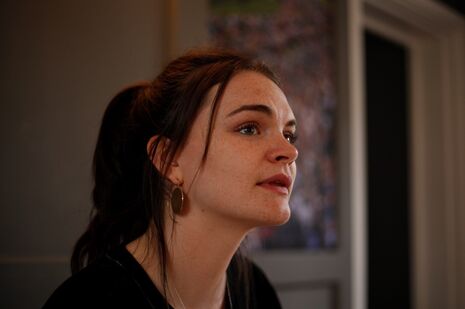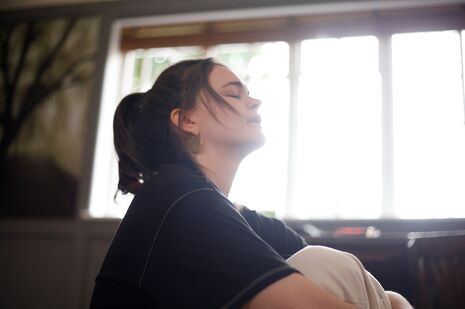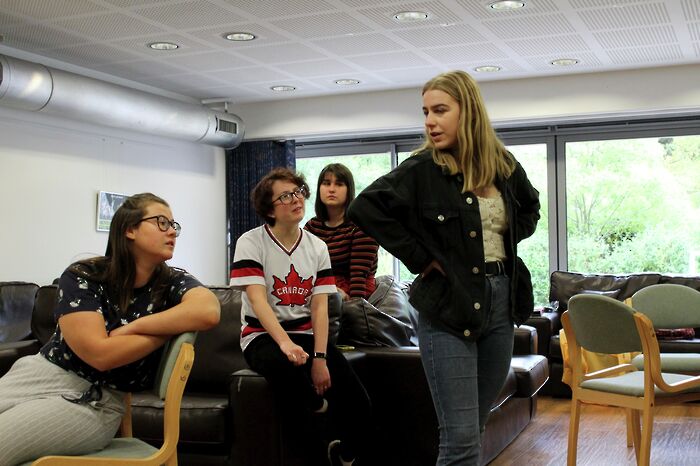Every Brilliant Thing at the Maypole
Riona Millar looks at a new production of Duncan Macmillan’s play

If you were wondering precisely how many brilliant things are in this play, there are a million – or a million and one, if you count the solo performance of Georgia Vyvyan. This is a one-woman show about a list: a list of all the brilliant things that the show’s only character can think of, as a way of helping her mother after a suicide attempt. Originally written by Duncan Macmillan and performed by comedian Johnny Donahoe, it began as a Fringe show and grew from there. In Cambridge, it is being shown upstairs at the Maypole, in a production funded and aided by the Old Vag Club.
Every night of the show will be different, based on the audience’s contributions
The Old Vag Club is a company that exists to support theatre outside of more conventional contexts, like in the upstairs of the Maypole. It is more than a funding body, director Russell Fancourt is quick to assure me, also offering resources, facilities, and emotional support in difficult moments. Apparently, the biggest difficulties that Every Brilliant Thing has faced is in the sheer size of the undertaking for Georgia Vyvyan – any one-person show will naturally provide the performer with a vast number of lines to be learnt. However, it seems that this has also been advantageous in terms of streamlining the show’s rehearsals and tailoring them specifically to Georgia’s needs, as well as creating an interrelated vision of director and actor.

As for this vision, the show deals with difficult themes, particularly chronic mental illness and the impact that it has on relationships. The initial Fringe run’s focus was much more on humour and on offering an uplifting perspective – the team working on the Cambridge run have chosen to look at the play more through the lens of coping with a life lived withdrawn from the world. Superficially, the play is about a list of a million brilliant things in the world (hence the name), but it soon grows into something much greater. This list begins as a coping mechanism for a child experiencing difficult and, indeed, adult things, and blossoms into an obsessional crutch that the main character uses to prop themselves up, as a way of avoiding the realities of living with a mental illness. This isn’t to say that the play isn’t hopeful, but Russell and Georgia are anxious to avoid the play ending with an easy fix, which just isn’t realistic or indeed appropriate in the context of a show constructed around the reality of chronic mental illness.
Every Brilliant Thing is the first show to be shown in the upstairs space at the Maypole. The size of the space is very much a help rather than a hindrance, however, with an area smaller than even the Corpus Playroom, allowing the intimacy between performer and audience to be heightened even further. The average Cambridge student baulks at the concept of “audience interaction”, but Georgia assured me that it would all be entirely non-confrontational. The role of the audience is to build on the element of intimacy in the play, but, in Georgia's words, any interaction is meant to feel like a warm embrace. Every night of the show will be different, based on the audience’s contributions, which also offers a uniqueness to each performance that only helps to keep things more close and, I think, loving.
I asked Russell if he could summarise the play in ten words. To cut a long story short, he could not. Georgia Vyvyan came up with “A play that looks at the formation and struggles of identity in relation to relationships and their interactions with mental health”, which the pedantic amongst you may note is 21 words and not ten. The conclusion to be drawn, therefore, is that this is not a play that can be neatly summarised or drawn up – nor is it one that the show’s cast and company especially want to be. Mental illness isn’t a question that can necessarily be answered – but, Russel says, “we can sure as hell try”.
 News / Colleges charge different rents for the same Castle Street accommodation2 March 2026
News / Colleges charge different rents for the same Castle Street accommodation2 March 2026 News / King’s hosts open iftar for Ramadan3 March 2026
News / King’s hosts open iftar for Ramadan3 March 2026 Theatre / Lunatics and leisure centres 4 March 2026
Theatre / Lunatics and leisure centres 4 March 2026 News / Angela Merkel among Cambridge honorary degree nominees27 February 2026
News / Angela Merkel among Cambridge honorary degree nominees27 February 2026 News / News in Brief: waterworks, wine woes, and workplace wins 1 March 2026
News / News in Brief: waterworks, wine woes, and workplace wins 1 March 2026








